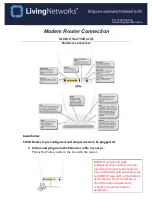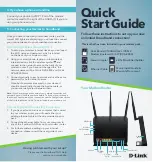
Chapter 18 Certificates
NWA-3500/NWA-3550 User’s Guide
233
18.4 Technical Reference
This section provides technical background information about the topics covered in
this chapter.
18.4.1 Private-Public Certificates
When using public-key cryptology for authentication, each host has two keys. One
key is public and can be made openly available. The other key is private and must
be kept secure.
These keys work like a handwritten signature (in fact, certificates are often
referred to as “digital signatures”). Only you can write your signature exactly as it
should look. When people know what your signature looks like, they can verify
whether something was signed by you, or by someone else. In the same way,
your private key “writes” your digital signature and your public key allows people
to verify whether data was signed by you, or by someone else. This process works
as follows.
1
Tim wants to send a message to Jenny. He needs her to be sure that it comes
from him, and that the message content has not been altered by anyone else
along the way. Tim generates a public key pair (one public key and one private
key).
2
Tim keeps the private key and makes the public key openly available. This means
that anyone who receives a message seeming to come from Tim can read it and
verify whether it is really from him or not.
3
Tim uses his private key to sign the message and sends it to Jenny.
4
Jenny receives the message and uses Tim’s public key to verify it. Jenny knows
that the message is from Tim, and that although other people may have been able
to read the message, no-one can have altered it (because they cannot re-sign the
message with Tim’s private key).
5
Additionally, Jenny uses her own private key to sign a message and Tim uses
Jenny’s public key to verify the message.
18.4.2 Certification Authorities
A Certification Authority (CA) issues certificates and guarantees the identity of
each certificate owner. There are commercial certification authorities like
CyberTrust or VeriSign and government certification authorities. You can use the
NWA to generate certification requests that contain identifying information and
public keys and then send the certification requests to a certification authority.
Summary of Contents for NWA-3550
Page 2: ......
Page 8: ...Safety Warnings NWA 3500 NWA 3550 User s Guide 8...
Page 10: ...Contents Overview NWA 3500 NWA 3550 User s Guide 10...
Page 20: ...Table of Contents NWA 3500 NWA 3550 User s Guide 20...
Page 22: ...22...
Page 40: ...Chapter 2 The Web Configurator NWA 3500 NWA 3550 User s Guide 40...
Page 80: ...Chapter 3 Tutorial NWA 3500 NWA 3550 User s Guide 80...
Page 82: ...82...
Page 92: ...Chapter 5 Management Mode NWA 3500 NWA 3550 User s Guide 92...
Page 108: ...Chapter 6 AP Controller Mode NWA 3500 NWA 3550 User s Guide 108...
Page 144: ...Chapter 8 Wireless Configuration NWA 3500 NWA 3550 User s Guide 144...
Page 168: ...Chapter 10 Wireless Security Screen NWA 3500 NWA 3550 User s Guide 168...
Page 182: ...Chapter 13 MAC Filter Screen NWA 3500 NWA 3550 User s Guide 182...
Page 186: ...Chapter 14 IP Screen NWA 3500 NWA 3550 User s Guide 186...
Page 194: ...Chapter 15 Rogue AP Detection NWA 3500 NWA 3550 User s Guide 194...
Page 216: ...Chapter 17 Internal RADIUS Server NWA 3500 NWA 3550 User s Guide 216...
Page 244: ...Chapter 19 Log Screens NWA 3500 NWA 3550 User s Guide 244...
Page 270: ...Chapter 21 Load Balancing NWA 3160 Series User s Guide 270...
Page 274: ...Chapter 22 Dynamic Channel Selection NWA 3160 Series User s Guide 274...
Page 286: ...Chapter 23 Maintenance NWA 3500 NWA 3550 User s Guide 286...
Page 287: ...287 PART III Troubleshooting and Specifications Troubleshooting 289 Product Specifications 297...
Page 288: ...288...
Page 296: ...Chapter 24 Troubleshooting NWA 3500 NWA 3550 User s Guide 296...
Page 304: ...304...
Page 398: ...Appendix F Text File Based Auto Configuration NWA 3500 NWA 3550 User s Guide 398...
















































